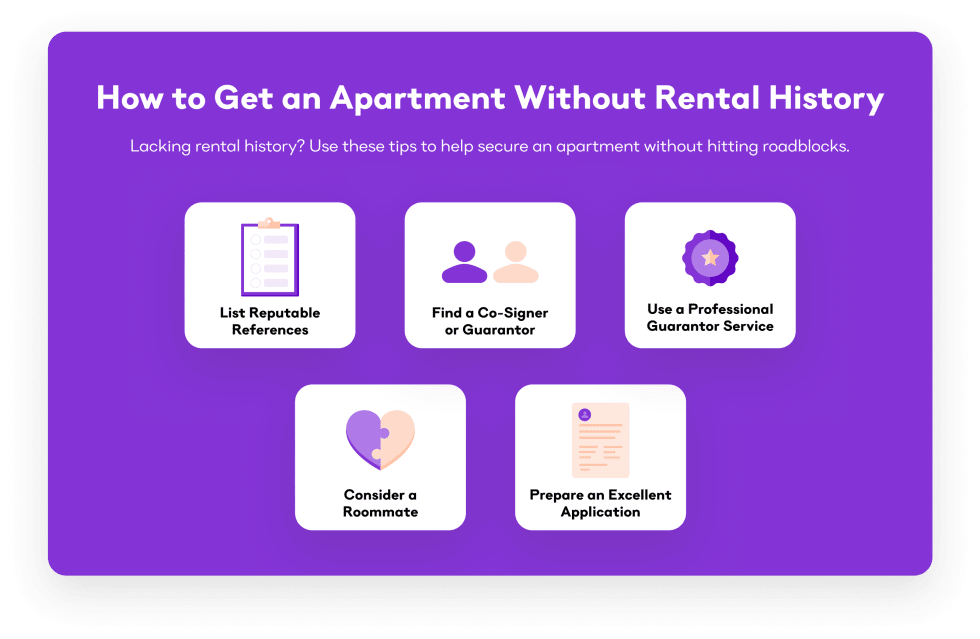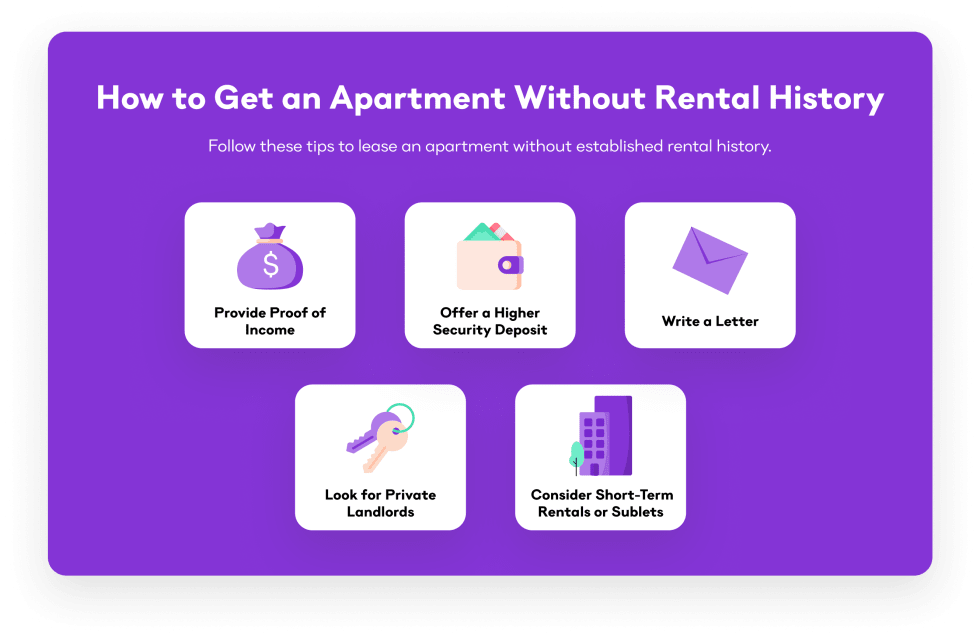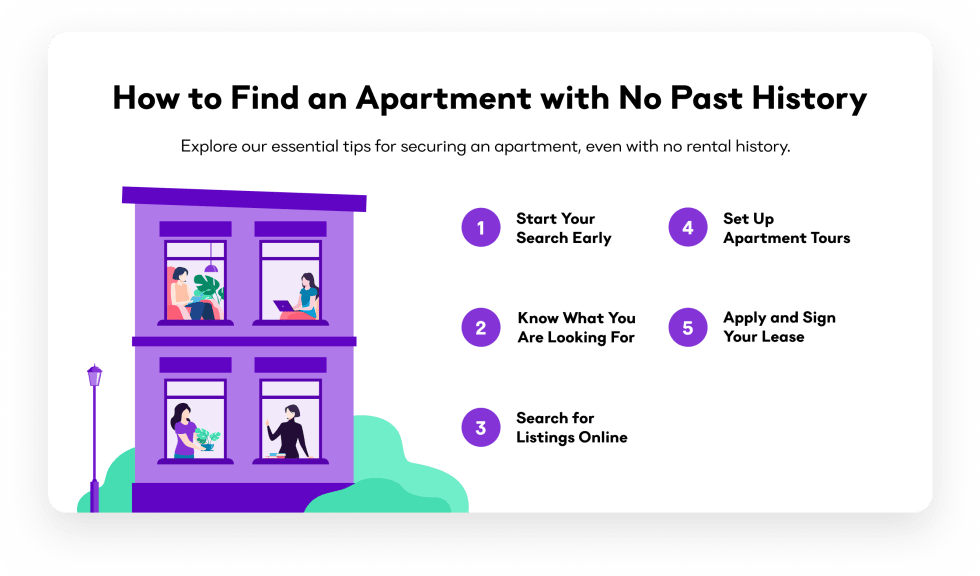How to Get an Apartment with No Rental History

Imagine the excitement of renting your very first apartment, picturing life in the ideal neighborhood with all the freedom and independence it brings. But then, reality sets in – how to get an apartment with no rental history. It's a common hurdle for new renters, and it can feel daunting at first glance. Yet, don't be discouraged.
With preparation, persistence, and a touch of creativity, securing an apartment without verifiable rental history is entirely achievable. Whether it's embracing flexibility in your search or being quick to act on a perfect find, the journey begins here, and we're going to walk you through the process.
1. List Reputable References

When you’re trying to secure an apartment without a rental history, you can rely on reputable references to lend you some credibility. Reach out to current or previous employers, professors, volunteer supervisors, or professional acquaintances who can vouch for your reliability and trustworthiness. These first time renter references may not be able to speak to your reputation as a tenant, but they can speak to your character and responsibility.
2. Find a Co-Signer or Guarantor
Whether you can’t find a reference for an apartment or want a leg up on the competition, having a co-signer or lease guarantor with a solid rental history can boost your chances of securing an apartment. Your co-signer or guarantor gives your landlord or property manager extra assurance that your rent will get paid. But it’s important to choose someone with a strong financial background who understands the responsibilities they’ll be taking on.
3. Use a Professional Guarantor Service
There are some work-arounds if you can't find a personal guarantor. A professional guarantor service acts as a third-party to step up and pay your rent if you can’t. These services do come with a fee, but are a viable option if you can’t find a guarantor in your personal network and your landlord wants a financial safety net.
4. Consider a Roommate
Taking on a roommate often makes it easier to secure an apartment than trying to find a guarantor. Landlords usually see roommates as a way to lower the risk and consider the combined income and rental history of the entire apartment. It can also make it easier for you to afford the rent and utilities. Make sure your potential roommate comes with a stable rental history and credit score to strengthen your application.
5. Prepare an Excellent Application
Make your apartment application stand-out by preparing a comprehensive look at everything you have to offer. Include the details about your employment and mention any outstanding details, like being promoted twice within a year’s time. You can also add personal background details, like you volunteer with a noteworthy organization. Remember to attach any relevant documents, including two pay stubs, character references, and a cover letter explaining your situation and commitment to being a responsible tenant.
6. Offer a Higher Security Deposit

Consider putting up more money without taking on a rent increase. Landlords often feel more secure if they have a substantial security deposit to fall back on should you fail to pay rent. Make sure all of the terms are properly outlined in your lease, so that when it comes time for you to move out, you can have your deposit returned in full.
7. Provide Proof of Income
A stable job and proof of income is often all landlords need to feel at ease with a new renter. Provide at least two pay stubs, employment contracts, or bank statements to prove you’re financially responsible to cover all your rent and expenses. You can also show proof of any side hustles or contract work that lead to financial windfalls throughout the year.
8. Write a Letter
Renting without rental history isn’t a deal breaker, especially if you write a sincere letter and explain your situation. For example, you can outline how you lived with your parents to save money during college or moved in with a relative. The goal is to show you’re a responsible and desirable tenant by making a sparkling first impression.
9. Look for Private Landlords
Private landlords are often more flexible and offer apartments that accept first time renters. They may be renting out their condo, a single-family home, or a townhouse. They’ll still need proof of income and references like any landlord, but you’ll find they’re more open-minded to your application.
10. Consider Short-Term Rentals or Sublets
You can start building up your rental history by looking into short-term rentals or sublets. Landlords still view these properties as legitimate rentals, even if you don’t have a long-term lease. Once you've established that you’re a reputable tenant and financially trustworthy, you’ll find it easier to secure a long-term lease.
How to Find an Apartment with No Rental History

You walked through the steps to renting with no rental history. Now, explore how to make the process of finding an apartment easier.
Start Your Search Early
Starting your apartment search early is key, especially if you have no recent rental history. Taking the time to explore your options not only gives you more choices but also provides a cushion against potential rejections that could otherwise disrupt your moving plans. Remember, rejection is a normal part of the process, especially if you're new to renting, so don't let it discourage you.
Timing also plays a crucial role in your hunt. While the warmer months from Spring to Fall are popular and often saturated with competition, the winter months, known for being one of the best times for finding an apartment, may provide unique opportunities for deals. These off-peak times are typically less competitive and might even be cheaper. So if your schedule allows, consider aligning your move with these quieter periods to maximize your chances of landing the perfect place.
Know What You Are Looking For
When apartment hunting with no rental history, maintaining flexibility in your preferences can be a game-changer. While your search will naturally encompass factors like amenities, layout, square footage, floor level, and views, remember that being flexible doesn't mean sacrificing what's most important to you.
Consider dividing your preferences into three categories before beginning your search: 'must-haves,' 'nice-to-haves,' and 'can-do-withouts.' By distinguishing between your essentials and your preferences, you'll be better prepared to make quick and informed decisions. This clarity not only helps you stay focused on what truly matters but also allows room for unexpected opportunities that could turn out to be just right for you.
Search for Listings Online
While physically hopping from one apartment complex to another might seem like a hands-on approach to finding your new place, it often turns out to be inefficient and time-consuming. Without prior knowledge, you may end up visiting places with no available units or ones that don't meet your expectations.
Instead, turning to online listings can be a more effective starting point. Websites offer pictures, reviews, details on amenities, and more, giving you a comprehensive view of what to expect. However, be cautious, as online information can sometimes be outdated or incomplete. Apartment List specializes in providing up-to-date rental information, city guides, and helpful tips, tailoring the search to your budget and preferences. Utilizing these resources can streamline your search and get you closer to finding the apartment that truly fits your needs.
Set Up Apartment Tours
Once you've narrowed down your list of potential apartments, arranging tours is your next step. Tours provide the vital first-hand experience of the space, and many complexes now offer diverse options like video tours or no-contact self-guided visits, while some may still offer traditional guided walk-throughs.
Understanding key aspects such as future rent increases, lease terms, allowable changes to the apartment, parking, and maintenance procedures is crucial before making a decision. These questions aren't just about ensuring the apartment meets your needs; they're about setting clear expectations and avoiding unwelcome surprises down the road. When heading to your next tour, arm yourself with these 26 essential questions to ask when renting to make the most of your visit.
Apply and Sign Your Lease
When you stumble upon an apartment that ticks all your boxes, don't hesitate to apply. That same unit may not be available tomorrow because fantastic amenities, desirable neighborhoods, and luxury apartments are in high demand.
Make Your Move: Start Apartment Hunting with Apartment List
Now that you know how to get an apartment with no rental history, you can confidently submit your applications and find the perfect place for you. It may take you a little more time to rent an apartment with no rental history, but these tips will help position yourself as a trustworthy tenant. Ready to find your next apartment? Sign-up with Apartment List to get started.
Frequently Asked Questions
What Documents Do I Need to Provide When Applying for an Apartment with No Rental History?
Documents you may need to provide when applying for an apartment with no rental history include the following:
- Proof of income: This could include pay stubs, tax returns, or a letter from your employer confirming your salary.
- Bank statements: This will show the landlord that you have a stable financial history and can afford to pay the rent.
- Employment verification: This could be a letter from your employer confirming your employment dates and salary.
- Personal references: This could include friends, family members, or former employers who can vouch for your character and responsibility.
In addition to these documents, you may also be asked to provide a copy of your driver's license or other form of identification. The specific documents that you are required to provide will vary depending on the landlord or property management company.
Share this Article




